道家英语简介
- 格式:ppt
- 大小:2.90 MB
- 文档页数:22
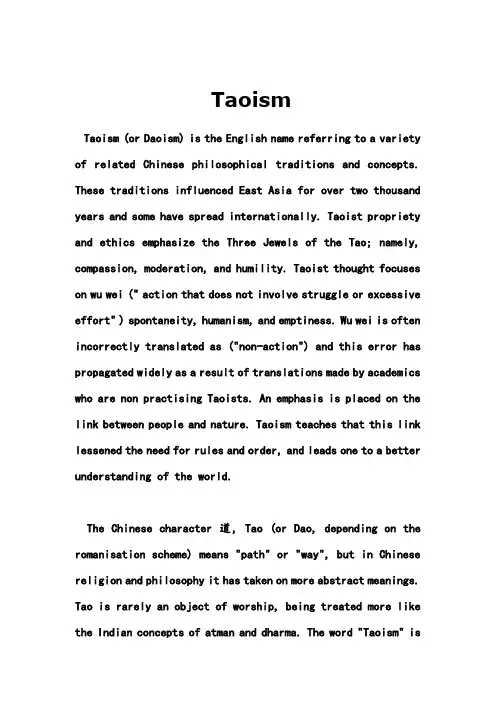
TaoismTaoism (or Daoism) is the English name referring to a variety of related Chinese philosophical traditions and concepts. These traditions influenced East Asia for over two thousand years and some have spread internationally. Taoist propriety and ethics emphasize the Three Jewels of the Tao; namely, compassion, moderation, and humility. Taoist thought focuses on wu wei (" action that does not involve struggle or excessive effort" ) spontaneity, humanism, and emptiness. Wu wei is often incorrectly translated as ("non-action") and this error has propagated widely as a result of translations made by academics who are non practising Taoists. An emphasis is placed on the link between people and nature. Taoism teaches that this link lessened the need for rules and order, and leads one to a better understanding of the world.The Chinese character 道, Tao (or Dao, depending on the romanisation scheme) means "path" or "way", but in Chinese religion and philosophy it has taken on more abstract meanings. Tao is rarely an object of worship, being treated more like the Indian concepts of atman and dharma. The word "Taoism" is usedto translate different Chinese terms. Daojiao/Taochiao (道教"teachings/religion of the Dao") refers to Daoism as a religion. Daojia/Taochia (道家"school of the Dao") refers to the studies of scholars, or "philosophical" Daoism. However, most scholars have abandoned the dichotomy of "religious" and "philosophical" Daoism.Most traditional Chinese Taoists are polytheistic. Nature and ancestor spirits are also common in popular Taoism. Organized Taoism distinguishes its ritual activity from that of the folk religion, which some professional Taoists (Daoshi) view as debased. This sort of shamanism is eschewed for an emphasis on internal alchemy among the "elite" Taoists.Chinese alchemy, astrology, cuisine, several Chinese martial arts, Chinese traditional medicine, fengshui, and many styles of qigong breath training disciplines are intertwined with Taoism throughout history.PrinciplesTaoist theology focuses on doctrines of wu wei ("action that does not involve struggle or excessive effort" ) , spontaneity, humanism, relativism and emptiness. This philosophical aspect of Taoism emphasizes various themes found in the Tao Te Ching (道德经) such as naturalness, vitality, peace, "yielding" (wu wei), emptiness (refinement), detachment, the strength of softness (or flexibility), and in the Zhuangzi such as receptiveness, spontaneity, the relativism of human ways of life, ways of speaking and guiding behavior. Taoism is a peaceful religion.HistoryTaoism's origins may be traced to prehistoric Chinese religions in China. They are found in the composition of the Tao Te Ching (3rd or 4th century BCE), or amidst the activity of Zhang Daoling (2nd century AD). Laozi received imperial recognition as a divinity in the mid second century CE. Taoism gained official status in China during the Tang Dynasty, whose emperors claimed Laozi as their relative. Several Song emperors, most notably Huizong, were active in promoting Taoism, collecting Taoist texts and publishingeditions of the Daozang. Aspects of Confucianism, Taoism, and Buddhism were consciously synthesised in the Neo-Confucian school, which eventually became Imperial orthodoxy for state bureaucratic purposes. The Qing Dynasty, however, much favored Confucian classics and rejected Taoist works. During the eighteenth century, the imperial library was constituted, but excluded virtually all Taoist books. By the beginning of the twentieth century, Taoism had fallen so much from favor, that only one complete copy of the Daozang still remained, at the White Cloud Monastery in Beijing. Taoism is one of five religions recognised by the PRC, which insists on controlling its activities through a state bureaucracy (the China Taoist Association).。

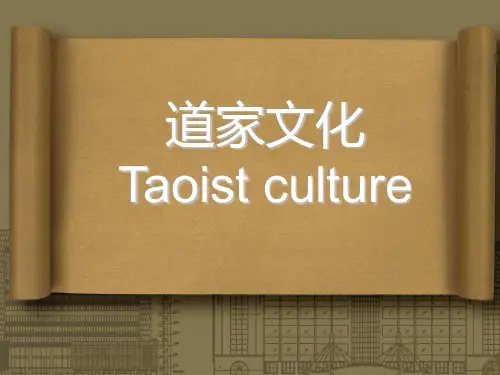
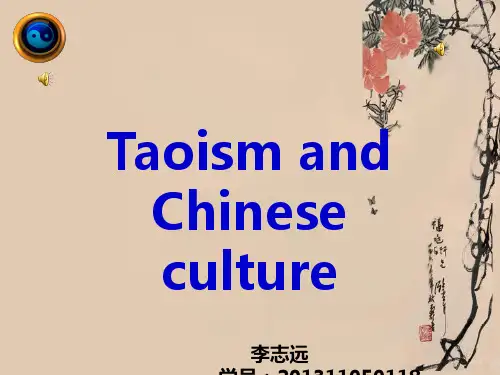
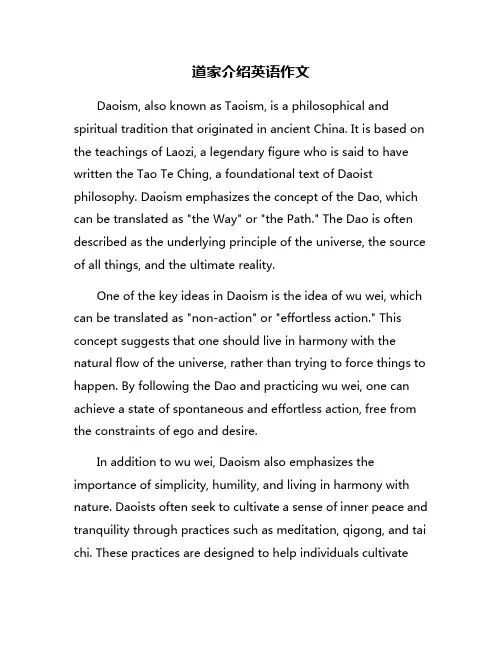
道家介绍英语作文Daoism, also known as Taoism, is a philosophical and spiritual tradition that originated in ancient China. It is based on the teachings of Laozi, a legendary figure who is said to have written the Tao Te Ching, a foundational text of Daoist philosophy. Daoism emphasizes the concept of the Dao, which can be translated as "the Way" or "the Path." The Dao is often described as the underlying principle of the universe, the source of all things, and the ultimate reality.One of the key ideas in Daoism is the idea of wu wei, which can be translated as "non-action" or "effortless action." This concept suggests that one should live in harmony with the natural flow of the universe, rather than trying to force things to happen. By following the Dao and practicing wu wei, one can achieve a state of spontaneous and effortless action, free from the constraints of ego and desire.In addition to wu wei, Daoism also emphasizes the importance of simplicity, humility, and living in harmony with nature. Daoists often seek to cultivate a sense of inner peace and tranquility through practices such as meditation, qigong, and tai chi. These practices are designed to help individuals cultivatetheir vital energy, or qi, and achieve a state of balance and harmony between body, mind, and spirit.Another important aspect of Daoism is the belief in the interconnectedness of all things. Daoists see the world as a complex and interconnected web of relationships, where everything is interdependent and constantly in flux. This perspective encourages individuals to cultivate an attitude of compassion and empathy towards all living beings, and to strive for harmony and balance in all aspects of their lives.Daoism also includes a rich tradition of mythology, folklore, and symbolism, with a pantheon of deities, immortals, and legendary figures. These stories and symbols are often used to convey deeper philosophical truths and moral teachings, and to inspire individuals to seek wisdom, virtue, and enlightenment.Overall, Daoism is a profound and multifaceted tradition that offers a unique perspective on the nature of reality, the human condition, and the purpose of life. Its teachings continue to inspire and influence people around the world, offering a timeless message of peace, harmony, and spiritual fulfillment.。
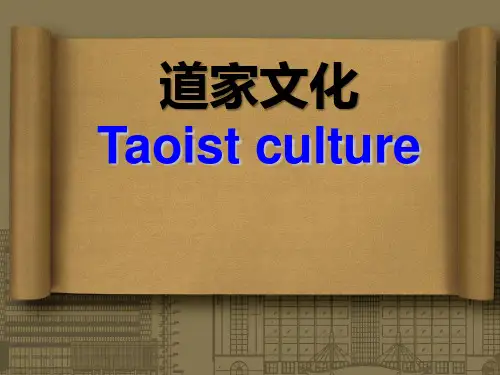
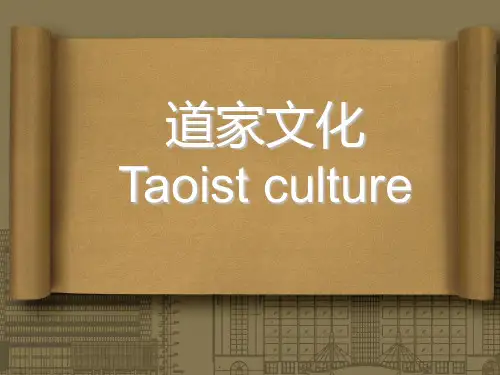
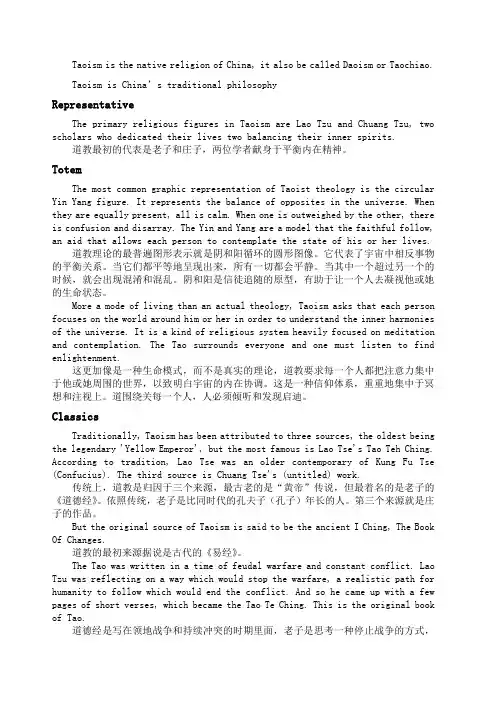
Taoism is the native religion of China, it also be called Daoism or Taochiao.Taoism is China’s traditional philosophyRepresentativeThe primary religious figures in Taoism are Lao Tzu and Chuang Tzu, two scholars who dedicated their lives two balancing their inner spirits.道教最初的代表是老子和庄子,两位学者献身于平衡内在精神。
TotemThe most common graphic representation of Taoist theology is the circular Yin Yang figure. It represents the balance of opposites in the universe. When they are equally present, all is calm. When one is outweighed by the other, there is confusion and disarray. The Yin and Yang are a model that the faithful follow, an aid that allows each person to contemplate the state of his or her lives.道教理论的最普遍图形表示就是阴和阳循环的圆形图像。
它代表了宇宙中相反事物的平衡关系。
当它们都平等地呈现出来,所有一切都会平静。
当其中一个超过另一个的时候,就会出现混淆和混乱。
阴和阳是信徒追随的原型,有助于让一个人去凝视他或她的生命状态。
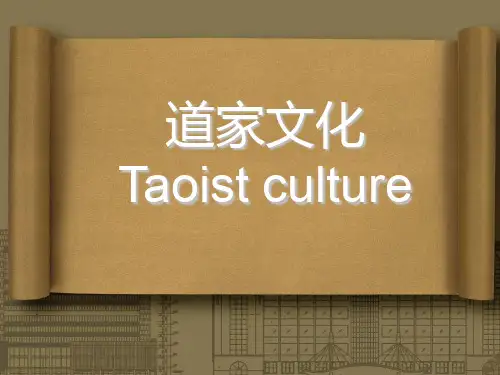
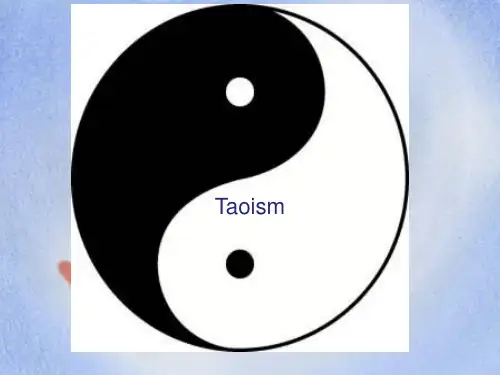
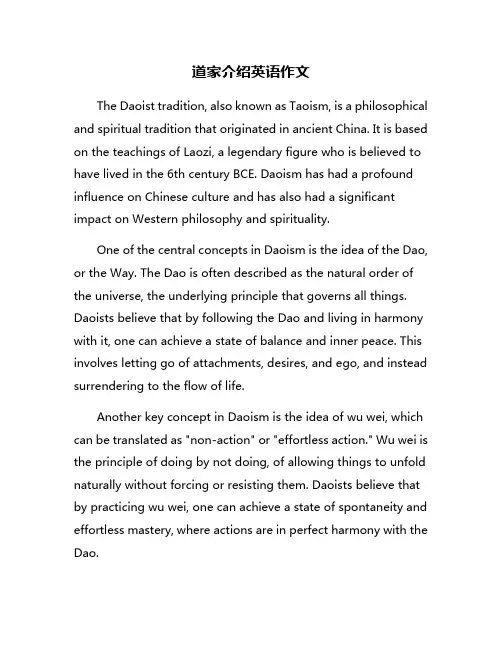
道家介绍英语作文The Daoist tradition, also known as Taoism, is a philosophical and spiritual tradition that originated in ancient China. It is based on the teachings of Laozi, a legendary figure who is believed to have lived in the 6th century BCE. Daoism has had a profound influence on Chinese culture and has also had a significant impact on Western philosophy and spirituality.One of the central concepts in Daoism is the idea of the Dao, or the Way. The Dao is often described as the natural order of the universe, the underlying principle that governs all things. Daoists believe that by following the Dao and living in harmony with it, one can achieve a state of balance and inner peace. This involves letting go of attachments, desires, and ego, and instead surrendering to the flow of life.Another key concept in Daoism is the idea of wu wei, which can be translated as "non-action" or "effortless action." Wu wei is the principle of doing by not doing, of allowing things to unfold naturally without forcing or resisting them. Daoists believe that by practicing wu wei, one can achieve a state of spontaneity and effortless mastery, where actions are in perfect harmony with the Dao.Daoism also emphasizes the importance of simplicity, humility, and living in accordance with nature. Daoists seek to live a life of simplicity and moderation, free from excess and extravagance. They also value humility and gentleness, believing that true power comes from softness and flexibility. Daoists strive to live in harmony with nature, observing its rhythms and cycles and respecting its wisdom.In addition to its philosophical teachings, Daoism also has a rich tradition of spiritual practices, including meditation, qigong, and tai chi. These practices are designed to cultivate inner peace, balance, and harmony, and to connect practitioners with the energy of the Dao.Overall, Daoism offers a profound and holistic approach to life, emphasizing the importance of living in harmony with the natural order and cultivating inner peace and balance. Its teachings have inspired countless individuals throughout history and continue to offer wisdom and guidance to seekers of truth and enlightenment.。
道家介绍英语作文Daoism: An Enduring Philosophy of Harmony and Balance Daoism, also known as Taoism, is an ancient Chinese philosophy and religion that has profoundly influenced Chinese culture and thought for over two millennia. Rooted in the wisdom of Lao Tzu, traditionally considered the author of the foundational text "Tao Te Ching," Daoism advocates for a life lived in accordance with the "Dao," often translated as "the Way." The Dao is a concept that embodies the fundamental order and principle of the universe, a force that flows through all things and connects them in a harmonious dance of existence. The essence of Daoism lies in understanding and embracing the natural flow of the Dao. It encourages individuals to cultivate inner peace and harmony by aligning themselves with the natural order of the cosmos. Unlike philosophies that emphasize striving and control, Daoism emphasizes "wu wei," which can be translated as "non-action" or "effortless action." This concept does not promote inaction but rather encourages acting in accordance with the natural flow of things, like water finding its patheffortlessly through the landscape. Daoism sees the universe as a tapestry woven with interconnected threads of yin and yang. Yin and yang represent the complementary and interdependent forces of nature, such as light and dark, masculine and feminine, active and passive. Daoists believe that true harmony arises from the balanced interplay of these opposing forces, recognizing that one cannot exist without the other. Central to Daoist practice is the pursuit of "de," often translated as "virtue" or "power." De represents the manifestation of the Dao in an individual's life, reflecting their ability to live in accordance with the natural order. It is cultivated through practices like meditation, contemplation, and mindful living, allowing individuals to connect with their inner selves and the universe's underlying harmony. While Daoism does not prescribe a rigid set of doctrines or commandments, it offers guiding principles for ethical living. It encourages compassion, humility, and simplicity, advocating for a life lived in balance with nature and in service to others. Daoists believe that true fulfillment comes not from material possessions or worldly pursuits but from living in harmony with the Dao and cultivating inner peace and spiritual growth. Daoism, with its emphasis on harmony, balance, and aligning oneself withthe natural order of the universe, continues to resonate deeply with people seeking meaning and purpose in a rapidly changing world. Its timeless wisdom offers a path towards inner peace, spiritual fulfillment, and a deeper understanding of ourselves and the universe we inhabit. This enduring philosophy serves as a reminder to embrace the ebb and flow of life, to cultivate inner harmony, and to find our place within the grand cosmic dance.。
道家介绍英语作文Daoism, also known as Taoism, is an ancient Chinese philosophical and religious tradition that dates back to the 4th century BCE. It is one of the major schools of thought in China alongside Confucianism and Buddhism. Daoism focuses on the concept of the Dao, which can be translated as the Way or the Path.The Dao is seen as the underlying principle that governs the universe and everything within it. It is a force that is both transcendent and immanent, representing the ultimate reality that cannot be easily defined or understood. The Dao is characterized by qualities such as spontaneity, simplicity, and harmony.One of the key texts in Daoism is the Tao Te Ching, written by the legendary figure Laozi. This text contains 81 short chapters that delve into the nature of the Dao and offer guidance on how to live in harmony with it. The Tao Te Ching emphasizes the importance of following the natural order of things and embracing the concept of wu wei, or effortless action.In addition to the Tao Te Ching, Daoism also has a rich tradition of other texts, practices, and beliefs. Daoist practicesinclude meditation, breathing exercises, and the cultivation of qi, or life energy. Daoists also believe in the existence of immortals, or beings who have achieved spiritual enlightenment and eternal life.Daoism has had a profound influence on Chinese culture and society. It has inspired artists, poets, and philosophers throughout history, shaping the way people think about the world and their place within it. Daoism has also had an impact on traditional Chinese medicine, martial arts, and feng shui.In conclusion, Daoism is a complex and multifaceted tradition that continues to be a source of inspiration and guidance for many people around the world. Its teachings on living in harmony with the Dao and embracing the natural order of things have timeless relevance and offer a unique perspective on the human experience.。